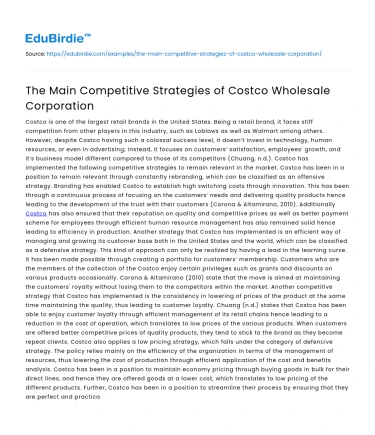Costco is one of the largest retail brands in the United States. Being a retail brand, it faces stiff competition from other players in this industry, such as Loblaws as well as Walmart among others. However, despite Costco having such a colossal success level, it doesn’t invest in technology, human resources, or even in advertising; instead, it focuses on customers’ satisfaction, employees’ growth, and it’s business model different compared to those of its competitors (Chuang, n.d.). Costco has implemented the following competitive strategies to remain relevant in the market.
Costco has been in a position to remain relevant through constantly rebranding, which can be classified as an offensive strategy. Branding has enabled Costco to establish high switching costs through innovation. This has been through a continuous process of focusing on the customers’ needs and delivering quality products hence leading to the development of the trust with their customers (Corona & Altamirano, 2010). Additionally Costco has also ensured that their reputation on quality and competitive prices as well as better payment scheme for employees through efficient human resource management has also remained solid hence leading to efficiency in production.
Save your time!
We can take care of your essay
- Proper editing and formatting
- Free revision, title page, and bibliography
- Flexible prices and money-back guarantee
Another strategy that Costco has implemented is an efficient way of managing and growing its customer base both in the United States and the world, which can be classified as a defensive strategy. This kind of approach can only be realized by having a lead in the learning curve. It has been made possible through creating a portfolio for customers’ membership. Customers who are the members of the collection of the Costco enjoy certain privileges such as grants and discounts on various products occasionally. Corona & Altamirano (2010) state that the move is aimed at maintaining the customers' royalty without losing them to the competitors within the market.
Another competitive strategy that Costco has implemented is the consistency in lowering of prices of the product at the same time maintaining the quality, thus leading to customer loyalty. Chuang (n.d.) states that Costco has been able to enjoy customer loyalty through efficient management of its retail chains hence leading to a reduction in the cost of operation, which translates to low prices of the various products. When customers are offered better competitive prices of quality products, they tend to stick to the brand as they become repeat clients.
Costco also applies a low pricing strategy, which falls under the category of defencive strategy. The policy relies mainly on the efficiency of the organization in terms of the management of resources, thus lowering the cost of production through efficient application of the cost and benefits analysis. Costco has been in a position to maintain economy pricing through buying goods in bulk for their direct lines, and hence they are offered goods at a lower cost, which translates to low pricing of the different products. Further, Costco has been in a position to streamline their process by ensuring that they are perfect and practical through proper management of the logistics, thus leading to low operation cost.
Moreover, Costco has also utilized the offensive strategy by creating its private brand, which is referred to as Kirkland. This has been achieved over time through benchmarking and constant innovation to improve on quality and hence, acts as an attraction to customers as well as it is a significant revenue generator to the company. Costco’s Kirkland brand encompasses of the apparel, organic and fresh foods; households essential, sporting goods as well as health and beauty products (Corona & Altamirano, 2010).






 Stuck on your essay?
Stuck on your essay?

